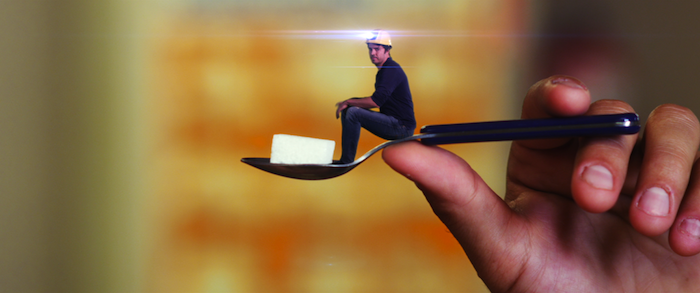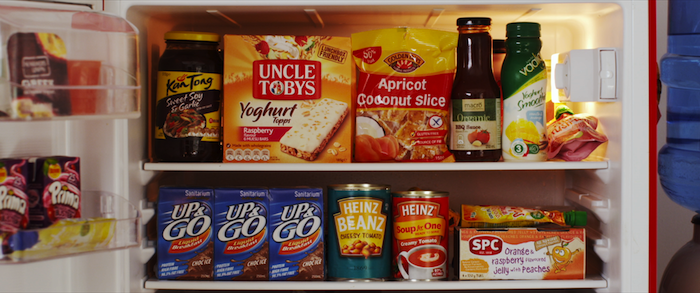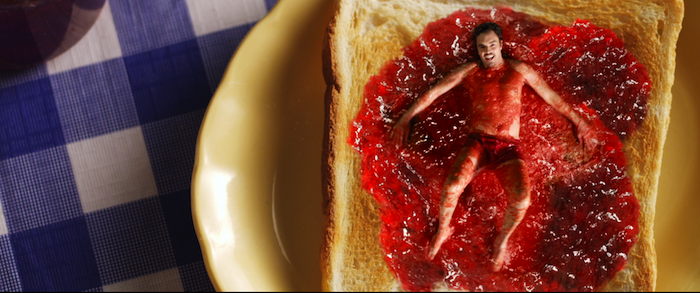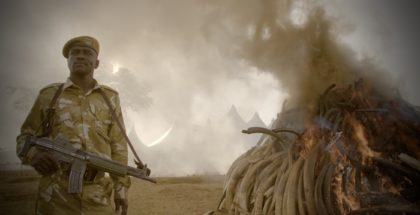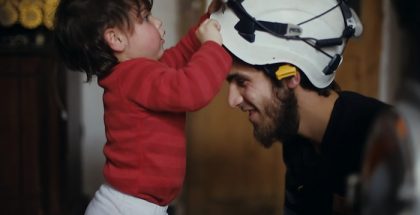Interview: Damon Gameau, director of That Sugar Film
Matthew Turner | On 30, Jul 2015
In the week that Tesco has banned Ribena, Rubicon and Capri Sun from its shelves in an attempt to reduce the number of sugary drinks bought for children, a documentary arrives that investigates the hidden sweet stuff in our food.
Directed by Damon Gameau, That Sugar Film is available now on DVD and to watch online on pay-per-view VOD service. We catch up with Damon to talk health, film-making and the importance of streaming in getting non-fiction films seen.
How did the film come about?
It came about because I’d met my girlfriend and started eating a lot better and people started commenting on how much better I looked, but I really didn’t give it any thought. And then I won a short film competition called TropFest in Australia and I met a production company and they said, “Do you want to make a feature film?” At the time, there was a bit of press starting to emerge about sugar, so I started reading a couple of books and I thought there’s something in this. I thought if you did tell the story of sugar, you’d have such a great palette to use in terms of the aesthetics and the colours and that Willy Wonka kind of playfulness…
There was a lot of debate over whether [sugar] was essential for health, so I thought, well, the only way I can find out the truth is to do an experiment on my own body and see what happens. So it was very low budget to begin with and we really didn’t know whether there were going to be any results from the experiment, but I guess it snowballed and more and more things happened to me that then correlated with things that were set in motion, so the film started going a lot at the time, we just started raising more money and the whole thing just sort of snowballed.
What was the biggest challenge you faced while making the film?
I guess the challenge, initially, was how to get it seen. With a topic like this and a message like this, you really want to get it out there and make it acceptable to people and I guess a lot of people have a preconceived idea that a docko [Australian slang for documentary] just has to be quite reverential and earnest and dry and a bit serious. And I guess that was always the challenge – once I could see that there was something in this, how do we get it to people that wouldn’t normally see a documentary, especially kids? I really aimed it at children and families so that it had a very broad, general appeal to it. And I guess that was the challenge at every turn, of how do we do it a bit differently, how do we make it fun, how do we make it more acceptable and that was a motivating force, the further we went on with the production.
Did you look at any other films in particular, in preparation for it?
Not really. I guess the main one it alludes to is probably Super-Size Me, which was one man’s experiment and I really struggled with that early on, because I thought, “Oh, this has kind of been done”, but the catch was that I wasn’t eating junk food and doughnuts and Coke – I think everyone knows if you have too much of that, or have it three times a day you’re going to get sick, but the catch with ours was that I wasn’t even aware of where this would hit me. I actually had a correspondence with Morgan Spurlock for quite a while and he was going to be in the film at one point, but I thought rather than making it derivative in some way, do we just embrace it, get him in the film so he can oversee the experiment and almost be like a Grand Master human lab rat that can oversee my mission. But he was doing the One Direction documentary, so we missed that one, but he was still really helpful, especially around the law – he actually studied law to see where he could find the loopholes so that he was filming in McDonald’s restaurants and what-not, so he really steered us in the right direction, since we were showing so many products, of how we could get away with it.
What were the tips on how to get away with it?
Well, the first thing was that you have to tell the truth. What we did in the film is we’re just deciphering labelling that’s probably made deliberately ambiguous by food companies, in that all they have to do is write sugars on the back and then put a number in grams, and no-one really knows what that means. So all I was doing in the film was saying 20 grams equals four teaspoons or five teaspoons, so in that way we weren’t telling any lies. And the other caveat was that it was conducted as research, so that’s where there’s a loophole, that you’re conducting an experiment on your own body, for the sake of an outcome or to find out a solution.
What was the biggest surprise that you discovered in the course of the film?
The two biggest were probably the effect on my mood. It’s only really that the Lancet, the medical journal, came out and said we need to acknowledge the links between food and mental behaviour, it’s just as important to prove as physical symptoms, so there’s a lot more fights going to go into that link between how foods make us feel and how they affect our ability to concentrate and learn and what-not, so that was something that definitely affected me – not that it would affect everyone the same way, but I certainly think that children might be having a high sugar breakfast to start the day and then really crashing and struggling to learn at school and I think that’s something that we need to address. And thankfully, a great conversation has come out of that in Australia with the film. And the other thing that shocked me was that my calories were equal, that I didn’t go out and just eat a tonne more calories, because I had quite a high-fat diet before, that I actually ended up hitting the same amount of calories and that really shocked people and even the medical people that were working on the film. And we began to log data that would back that up, that we know that sugar and fructose in particular behave very differently in the body to other calories and that makes them very unique in that way.
How important is Netflix and VOD in general to documentary film-making and distribution?
I certainly learned a ton about distribution making this film. Obviously, we were very lucky in Australia, I think it’s just become the highest-grossing documentary of all time in cinemas [there]. So I completely acknowledge that we’ve been really lucky, but I’ve always thought that the cinema run was kind of superfluous, I’m looking forward to it getting online or getting onto Netflix or video on-demand, because I think less and less people are going to the cinema now, unless it’s a kind of a event, like a big blockbuster with a tonne of effects, then they’ll go and pay that money and have that experience on a huge screen, but as you know, so many people are now watching films on their laptops or their phones or whatever it is, so I guess for me, and many other documentary filmmakers would say the same, as long as it’s seen and gets out there, that’s all I care about – especially a film like this, I want it to be seen so people can start maybe living healthier lives and heal themselves a little bit, and especially with their kids.
Are there plans to get the film shown in schools?
Yes, we’re lucky enough to be involved with this organisation called Good Pitch, which is out of BritDoc and the Sundance Institute. So basically, we pitched the film to a room full of philanthropists and they gave us a stack of money to be able to develop all these outreach tools, so we’ve done a Study Guide from grades 5 to 11, so the school gets the DVD, the book, there’s a free app, they get charts and posters, and then teachers get Study Guides to do a whole term, just teaching the concept of the film. So we’ve got a thousand schools signed up for that in Australia and we’re just talking to some people now who are very excited to roll it out in the UK and get it into schools as well.
What’s your own Netflix use like? Do you watch a lot of stuff on Netflix and if so, what have you been watching recently?
I don’t. I hate to admit it, but I’m just someone who – I really just don’t watch TV. I really don’t watch much. Especially last year, I’ve just had my head buried in so many other things for this film and trying to make it that any time I’ve got, my girlfriend and I try and do something or go out, or spend time with our daughter. So I’m so far behind, on so many things, I cringe – I’ve never seen one episode of Game of Thrones, or Breaking Bad and the amount of shit that I cop for that from my friends is just unbelievable! So I’m seriously hoping that once all this Sugar madness dies down, which is once we’ve released it in other parts of the world, I want to be able to sit down for three weeks and just catch up with so many things that I’ve put on the list.
What’s first on the list?
Well, people tell me that True Detective is very good, that that’s something I should watch. So that’s it so far and I probably feel like I should at least watch just the first episode of Game of Thrones, just so that when people say things to me, I know what they’re talking about.
Do you have a favourite scene in That Sugar Film?
Probably the Aboriginal section, to me – it’s something very dear to my heart. I was an actor, so I’ve been an actor for ten years and I did a film with a very famous Aboriginal actor years ago and he invited me up to his homeland. I spent two weeks there and had a great time and just saw how much Coke they were drinking. So for me it was really important to go back and tell their story and to get the local natives to start that programme [of education about sugar and diet] again, so we’ve re-employed the guy that’s in the film and set up some nutritional care and found some people that are working in the stores full time now, they’re teaching other people how to eat smarter foods and what-not, so that, to me, is a great story and I’m very proud of that, so that whole section is something that I really like in the film. It’s quite a diversion for us to tell, it’s not that up-beat and neon, and a lot of the producers didn’t think that section would work, but I’m really glad it’s in there, because it kind of grounds the film a bit.
Did you cut anything out that you were sorry to see go?
Yeah, the first cut was about three hours and forty-five minutes… We had a couple of extra really great scenes with Hugh Jackman on that day that we just couldn’t get in there, Stephen Fry did a really good interview that we couldn’t quite get in there, and there was a lot of other stuff that went more into the politics of the manipulation of the food industry and the covering up, but we just had to think of that audience in mind and that’s the broader appeal to kids and parents, so it just got a little bit too edgy and political and I was aware that kids wouldn’t sit through that stuff, so we had to lose some of it.
Do you have any idea of your next project?
[Laughs] I’m trying to make That Sleeping Film at the moment, but it’s certainly not going very well, not with a 19-month-old daughter! I can’t even think at the moment, there’s so many things that have happened with the film and it’s got such a life of its own, that I’ve really put everything aside. We’re releasing the film in America in July, actually, the guys that did Super-Size Me are releasing it, so once that’s done, I’ll take a few deep breaths, give myself a holiday for a couple of weeks and then I’ve certainly got some ideas for the next docko, and an idea for a narrative too, so I’ll get to them, but I promised my family I won’t start till January…
That Sugar Film is available to watch online on Amazon Prime Video as part of a Prime membership or a £5.99 monthly subscription.


